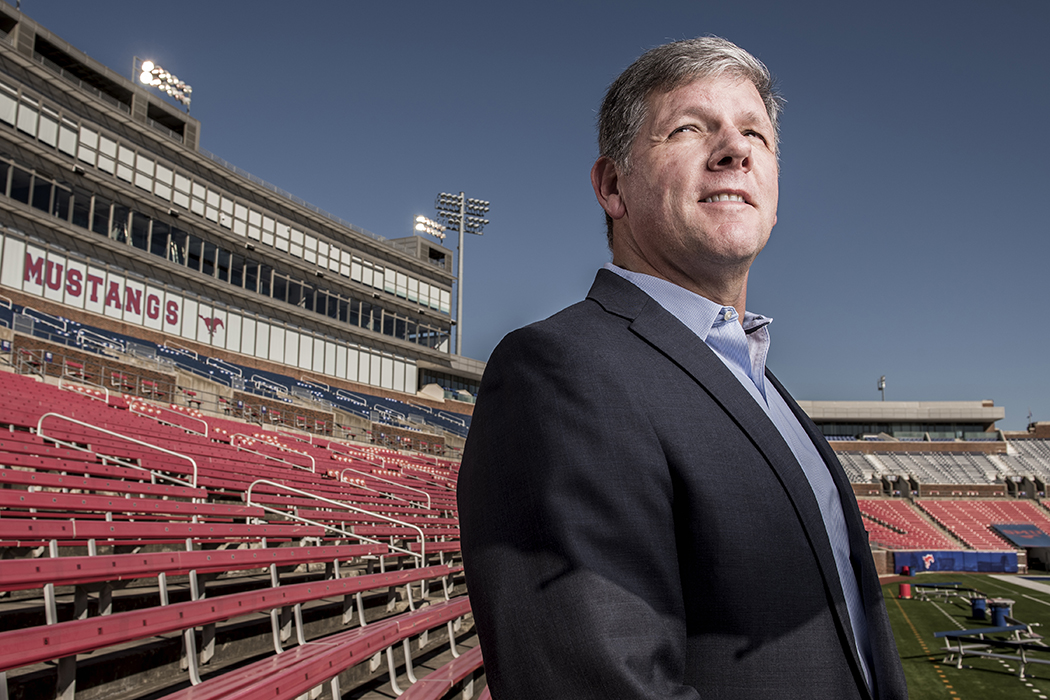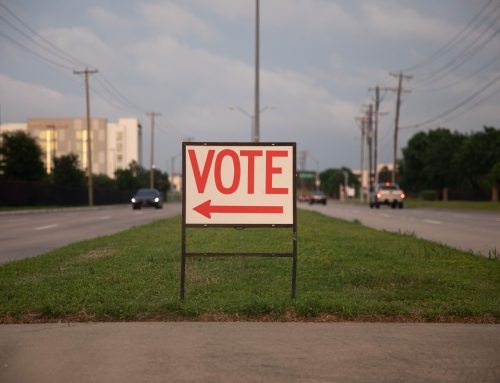
David Blewett won a conference championship while playing at SMU. (Photo by Danny Fulgencio)
After the scandal
David Blewett could have let the most infamous moment in college football ruin the rest of his life, but he didn’t.
He was a member of Southern Methodist University’s team in the mid-1980s that went from being nationally ranked to receiving the “death penalty,” when the NCAA canceled its 1987 season. In many ways, the team never recovered, but the moment that took what Blewett loved most put him on a path of personal redemption that would change his future.
Blewett wrote a book about his experience on that fated team called “Pony Trap.” In it, he describes SMU football as a name that once inspired fear in its rivals. With nationally ranked teams, top-ranked recruits and a bevy of players heading to the NFL, they were a force.
According to Blewett, and an ESPN “30 for 30” documentary, it was difficult for any Division I football program at the time to land elite recruits without illegally paying the players on the side. Most of the payments were small contributions for food or transportation, but there were more sizable gifts being passed under tables as well.
The NCAA tried to crack down on these illegal payments, but it needed to tread lightly, as the organization received its power from the very universities it was tasked to police. If the NCAA wanted to make an example of a school that was cheating, SMU was the perfect candidate. It was a smaller school, lacking the power of more established entities, but was also successful on the field, rivaling established football schools such as the University of Texas in Austin.
When the NCAA communicated with a couple of disgruntled former SMU football players who had been paid (but not enough to keep quiet), the NCAA found its smoking gun.
“It was the perfect storm,” Blewett says.
The result was swift and hefty. NCAA canceled SMU’s season in 1987, the only time that has ever happened to a university, despite other cheating scandals. No one could have predicted the hurt. The program never reached the same level of success again.
“It’s zombie penalty,” Blewett says. “Here we are, 25 years later, and it’s still out there.”
Blewett says he was not one of the paid players, and was given the option to transfer to another school to continue his college football career, but decided to stay at SMU to finish his degree and double major in philosophy and finance. The weeks after the penalty, though, left him despondent and aimless.
Decades later, Blewett was raising his children (he now has seven) with his wife in East Dallas when he became aware of the “30 for 30” documentary made in 2010 by ESPN about the SMU cheating scandal. Blewett wasn’t part of the documentary (he never called the director back, wary of the media after his college years) and was not engaged with the university or team at the time. But his daughter saw the film, and had questions.
“I heard something bad happened there. Did you do anything wrong?” she asked.
The question planted a pit in his stomach that began to grow, inspiring him to seek redemption in a familiar place. He decided he would get back in shape, and attempt to use his remaining football eligibility to play for his alma mater. He only played two years in the 1980s, and if he got approval from the NCAA and SMU, he could play for the team again. He wanted to prove to himself and his family that he could do it, and while he knew that a 40-year-old man probably couldn’t compete for an entire season with college athletes, he saw a higher purpose.
In Blewett’s eyes, SMU never owned up to its sins and accepted responsibility, instead carrying on like the scandal never happened, shunning the players involved and trying to outrun the problem.
“SMU needs to have a cathartic moment,” he says. “They need to say, ‘Here’s what we did wrong, please forgive us of our sins and let’s start over.’ ”
Blewett thought making the team would atone the university, both rectifying the past and symbolically welcoming a generation of players who were looking to reconnect with their old school.
Blewett worked for months and was in the best shape of his life, but in the end was not given an opportunity to play by the coach. He understood that he would be a distraction to a team trying to win games, but was still disappointed. There was a silver lining, however.
“There is nothing sad about this at all,” he says. “Throughout the process, I reengaged with friends, reengaged with the university and reengaged with my physicality.”
The experience led him to write his book, which tells the story from the players’ perspective rather than the media’s or the NCAA’s. He has since run for city council and has plans for more books in the future.
“When you try these things, even when you fail, you learn things and it makes you a better person,” he says. “I don’t have the fear of putting myself out there anymore.”
These days, Blewett works in real estate, raises his children, and stays busy volunteering at Stonewall Jackson Elementary and SMU.
He turned what could have been a shameful chapter into a transformative moment and doesn’t regret any part of it.
“I would go back to SMU again, even knowing all the stuff we went through,” he says. “It’s crazy when I say it out loud, but it’s true.”





